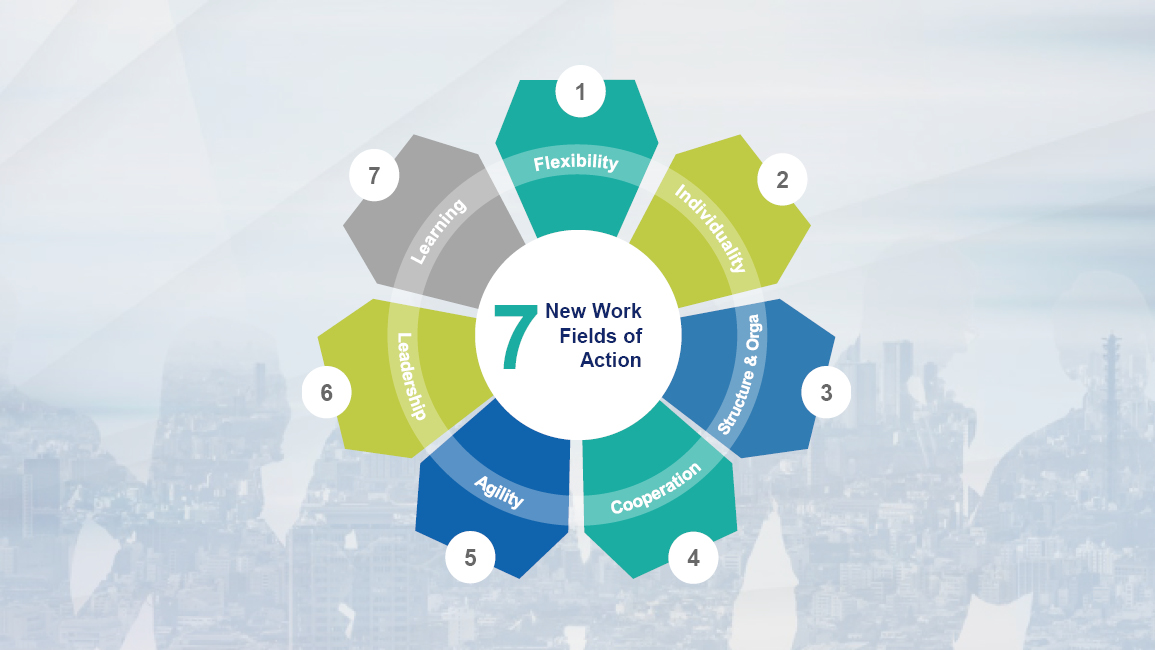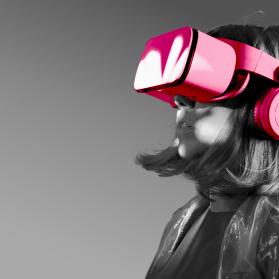The Corona crisis has not only turned our everyday working lives upside down in a very short time, it has also changed our mindset. It is what is known as disruptive. And disruption is when the old doesn't work anymore. "50% of the participants in a survey don't want to go back to the pre-Corona era," futurologist Matthias Horx recently spoke at a Deutsche Telekom employee event. No wonder, according to Horx, since crises are often enablers for new thinking and action. But where is the journey heading? What will it look like, the new normal? What will remain, what will go?
During the weeks of the crisis, we spoke intensively with our customers and partners. We asked questions, listened and exchanged views with representatives of a wide range of companies about their challenges, how they dealt with the crisis and what they learned. We have summarized these in a compact study, which can be obtained via this link.
This much in advance: The question of whether we will continue to work from home or return to our offices definitely falls short. The transformation of the working world will be a thorough one and will penetrate deep into the culture of many companies. In addition to 'Where do we work?", the focus will be on 'How do we work?" and especially "How do we work together?".
From our discussions with decision-makers from companies such as Debeka, innogy, Zeiss and T-Systems, we ultimately identified seven fields of action for New Work in which companies should become active now.

-
Flexibility: COVID-19 forced us to be more flexible and provided proof of concept that employees can (and want to) work at home. We learned that productivity is not linked to presence, but is possible at any location. According to a recent survey by the Fraunhofer Institute, 40 percent of respondents said they are more productive in a home office. It all comes down to the right mix: After switching from one extreme (presence) to the other (home office), a hybrid work model that combines both extremes will be needed in the future.
-
Individuality: New Work can not only contribute to productivity and economic success, but also lead to greater employee satisfaction. In the future, a company's HR policy should seek to provide employees with the working environment that suits their individual life situation and way of working. If we experience competence, self-determination and influence, this can lower our personally experienced stress level in the long term and improve our mental health. Digitalization makes it possible, in the crisis we were forced to do it - and lo and behold, it wasn't that hard.
-
Structure and organization: With more flexibility also in terms of working hours, it's no longer about balancing life and work, but about integrating life and work. Even if the situation regarding childcare during the crisis was an absolute exception, it still acts as a burning glass. The question of how to reconcile private care work and child care with work will remain after COVID-19, which is why the right course must be set now.
-
Collaboration: Virtual collaboration also experienced a significant upswing as a result of the crisis: meetings, check-in calls, coffee dates and much more were transferred to the virtual world. However, what continues to be missing, and where even socializing formats and apps cannot remedy the situation, is spontaneous exchanges at the coffee machine. Such informal meetings are not only conducive to employee retention, but are also considered innovation drivers for the entire company. In the future, spaces and opportunities for planned or chance encounters must be created here - digitally and analogously.
-
Agility: An agile mindset and agile working methods have proven their worth during the crisis precisely because of their high compatibility with virtual work. Building on this experience, measures that promote agility must be rolled out further in order to be prepared for the future.
-
Leadership: A new work culture also means developing a new understanding of leadership. Not every good leader in traditional presence structures is automatically a good leader in virtual collaboration. Newly emerging hybrid models in particular require new leadership in terms of topics such as motivation, feedback and error culture, and process structures. There must be a development toward coaching employees, a shift from control to trust.
-
Learning: The digitalized world is producing new methods and tools at ever shorter intervals to meet our highly flexible way of working. This creates the need to learn anew again and again. The regular acquisition of new skills must take place in a timely and demand-oriented manner, and training must ideally be possible at any time and any place. This requires new forms of learning; lifelong learning becomes an integral part of work.
We already know today: COVID-19 has accelerated processes that were already apparent in the world of work. In numerous New Work projects, we have accompanied our customers on the way to their individual New Work concept in the dimensions of People, Places, Tools and Regulations.
To return to Matthias Horx, the 9-to-5 office routine will no longer exist in the post-Corona era. Horx goes even further: For him, this mind shift was overdue. Far too much, he says, our mindset was still anchored in the era of the industrial society and had not arrived in the knowledge and data economy. "You can't grasp the new with old thinking," Horx said.
Now the course must be set for New Work in the New Normal of the post-Corona era - a work culture based on flexibility and individuality. This requires courage in many places and letting go of the tried and true. It will be crucial to find the perfect synthesis between old and new, but also between digital and analog.
Many thanks to Ingrid Blessing for her collaboration on this article.
To the German-language Detecon study:
New Work after COVID-19: 7 Fields of Action for Your Way into the New Working World
Also worth reading (in German-language):







